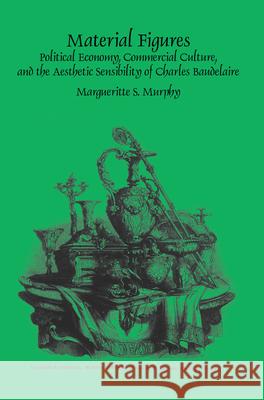Material Figures : Political Economy, Commercial Culture, and the Aesthetic Sensibility of Charles Baudelaire » książka
Material Figures : Political Economy, Commercial Culture, and the Aesthetic Sensibility of Charles Baudelaire
ISBN-13: 9789042035263 / Angielski / Miękka / 2012 / 252 str.
Material Figures : Political Economy, Commercial Culture, and the Aesthetic Sensibility of Charles Baudelaire
ISBN-13: 9789042035263 / Angielski / Miękka / 2012 / 252 str.
(netto: 327,04 VAT: 5%)
Najniższa cena z 30 dni: 344,20
ok. 30 dni roboczych
Bez gwarancji dostawy przed świętami
Darmowa dostawa!
Ideological debates about economics and aesthetics raged hotly in nineteenth-century France. French political economy was taking shape as a discipline that would support free-market liberalism, while l'art pour l'art theories circulated, and utopian systems with aesthetic and economic agendas proliferated. Yet, as this book argues, the discourses of art and literature worked in tandem with market discourses to generate theories of economic and social order, of the model of the self-individuating and desiring subject of modernity, and of this individual's relationship to a new world of objects. Baudelaire as a poet and art critic is exemplary: Rather than a disaffected artist, Baudelaire is shown to be a spectator desirous of both art and goods whose sensibilities reflect transformations in habits of perception. The book includes chapters on equilibrium and utility in economic and aesthetic theory, on the place of the aesthetic in press coverage of the industrial exhibitions, on the harmonic theories of Baudelaire's early art criticism, aimed at a bourgeois audience, on Baudelaire's radical cosmopolitanism learned through viewing "objects" on display at the Universal Exhibition of 1855, and on Les Fleurs du Mal and Le Spleen de Paris, where language makes visible the traits of a new material world.











